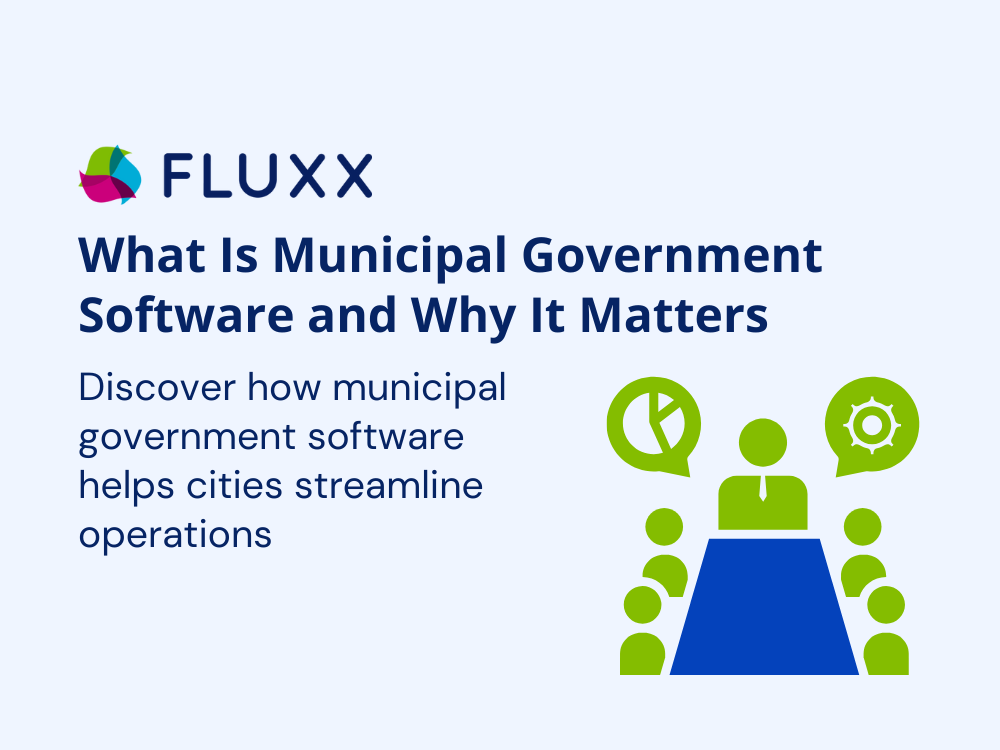What Are Formula Grants?
Discover what formula grants are, how they work, their key differences from other grant types, and how Fluxx's grant management system streamlines...
Be the first to know about new Fluxx grants management resources, blog articles and podcasts.


Cities, towns, and counties—those municipal governments—are at the forefront of public service. From providing roads and utilities to managing housing programs and grant programs, the list of what a city government must do is staggering. With demands increasing and resources remaining scarce, digital infrastructure is becoming an unavoidable necessity.
Municipal software means those programs that aid local agencies to perform their functions efficiently and openly. From permitting through budgeting and grant administering, these programs alleviate administrative burdens, promote accountability, and enable improved delivery of service.
In this blog, we delve into how municipal software operates, what is most needed, how it's different from other levels of government software, and how grant management software plays a role within the larger picture.
Municipal government software refers to a class of digital products specifically designed to address the requirements of governmental agencies at the local level. They facilitate streamlined internal processes, compliance with state and national requirements, citizen engagement, and performance tracking.
Usually, municipal software is designed to:
Contrary to generic business software, municipal software is designed to accommodate public sector regulations and operational conditions of city and town agencies. They typically have built-in public records workflows, compliance measures, and budget constraints.
The appropriate municipal government software not only optimizes workflow—it optimizes results. By automating and bringing processes into one hub, cities can respond more quickly, save money, and improve the citizen experience.
Core benefits are:
Software empowers cities with the capability to undertake sophisticated, high-volume processes without sacrificing precision or speed.
There are likely to be dozens of applications used by local government, but some categories of software are critical to everyday functions and strategic planning:
Grant Management Software
Used by city managers and grant administrators to manage federal, state, and local grants—monitoring applications, compliance, disbursements, and impact.
Financial and Accounting Systems
Enable finance teams to administer multi-year budgets, funding distributions, payroll, and audit preparedness, frequently linked to grant funding.
Permitting and Licensing Tools
Enable planning, zoning, and health departments to make efficient permit and license issuances, ensuring compliance with regulations and tracking revenue.
CRM Systems for Citizen Services
Track requests, complaints, and service fulfillment to enhance constituent satisfaction and operational responsiveness.
Document and Records Management
Assist legal and administrative offices with tracking contracts, FOIA requests, and historical records through secure version control.
Project and Asset Management Software
Provide support for infrastructure programs, building maintenance, and capital upgrade initiatives for city properties.
These technologies together make up the digital backbone of a well-managed city government.
Although municipal, state, and federal software tend to perform similar purposes—like money management or compliance with regulations—city-level software is specifically tailored to handle hyper-local issues.
Key differences include:
Municipal software should be agile, secure, and user-friendly—providing enterprise-level functionality without cost or complexity.
Some of the most essential programs at the municipal government—affordable housing, public health, infrastructure, broadband access—are grant programs. Through federal block grants, state matching funds, or regional programs, municipalities have to look to outside funding to have the work accomplished.
Without grant management software, cities face common pitfalls:
Grants are vital to municipal innovation—and so is proper management of them.
Fluxx's grant management software is designed to meet the specific requirements of municipal governments—providing automation, compliance monitoring, and team collaborative workflows within an intuitive, configurable, and secure platform.
With Fluxx, municipal agencies can:
Fluxx minimizes administrative burden, maximizes transparency, and makes every dollar traceable—enabling local governments to do more with less.
Municipalities are expected to do everything—on schedule, within budget, and with complete openness. Municipal software is how cities address this challenge, and grant management software such as Fluxx is an essential component of the solution.
By embracing purpose-designed platforms, agencies locally can save time, be cost-effective, and have a greater impact—providing smarter services to those whom they serve.
Ready to learn how Fluxx can transform your city's grant management to be modern and efficient? Schedule a demo.
Discover what formula grants are, how they work, their key differences from other grant types, and how Fluxx's grant management system streamlines...
Explore the essential roles and responsibilities in grant management, how they vary by grant type, and how software like Fluxx supports each function...
Explore how grants for religious organizations differ, who qualifies for them, and how grant management software like Fluxx simplifies their...
Be the first to know about new Fluxx grants management resources, blog articles and podcasts.